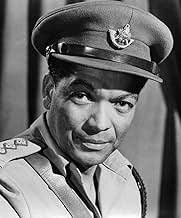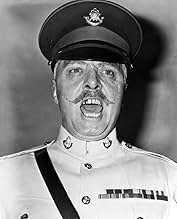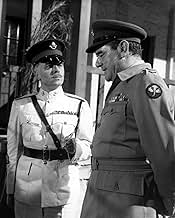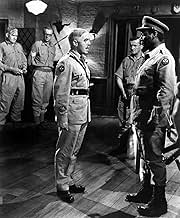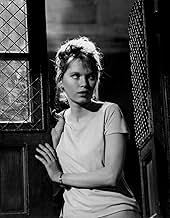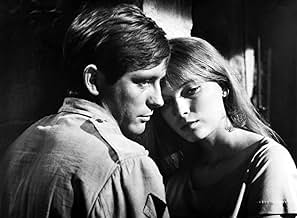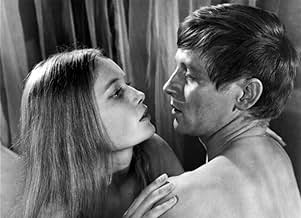ÉVALUATION IMDb
7,1/10
2,1 k
MA NOTE
Ajouter une intrigue dans votre langueAnachronistic strict Regimental Sergeant Major Lauderdale (Sir Richard Attenborough), on a remote colonial African army caught in a local coup d'etat, must use his experience to defend those... Tout lireAnachronistic strict Regimental Sergeant Major Lauderdale (Sir Richard Attenborough), on a remote colonial African army caught in a local coup d'etat, must use his experience to defend those in his care.Anachronistic strict Regimental Sergeant Major Lauderdale (Sir Richard Attenborough), on a remote colonial African army caught in a local coup d'etat, must use his experience to defend those in his care.
- A remporté le prix 1 BAFTA Award
- 2 victoires et 2 nominations au total
Avis en vedette
I discovered this film, quite by chance, whilst looking through the early evening schedules for BBC1. Billed in the newspaper as a "Second World War drama" it is anything but, actually being set in early '60s East Africa just after countries like Kenya achieved independence from Britain. Richard Attenborough is splendid as the RSM who worships "spit and polish" as much as he does HM The Queen. (Odd to think she's still on the throne and "reigning" over the same but very much changed realm.) Attenborough's characterisation of the type of man who ran the British Army is spot on. Are such men still with us? Flora Robson also gives a entirely believable performance as the naive and opinionated Labour MP. We know such women are still amongst us. The supporting cast of actors portraying the sergeants and reluctant conscript give this film great credibility. Mia Farrow is an unexpected guest and we can only envy Wilkie for getting his wicked way. Jack Hawkins, as ever, gives a stock performance as the officer who remains stiff upper-lipped in the face of adversity. Altogether an unexpected treat.
I remember seeing this film when it first came out and recall it made an impression on me as a young man. Saw it again last night on Fox Classics during war film week in the first week of November and it impresses me even more.
Since the first viewing I have experienced a military career in the air force and as a trainee pilot our WOD (Warrant Officer Disciplinary) could have been RSM Lauderdale to a tee. They just seem to know all about life and know what to do or say in any situation. And they have a wonderful innate knowledge of the big picture as well as the most intimate attention to detail. I am sure that this type of military rank was a vital cog in winning every war that has ever been won.
Loved the script - why, oh why, don't the smash, crash, wallop Hollywood script writers look at these old classics and learn how to put an interactive character piece together which can keep you on the edge of your seat without having cars smash through plate glass windows? Richard Attenborough certainly earned his BAFTA for his performance not only for the way he delivered his lines but his visual representation to every bat of his eyelid and twitch of his moustache.
My only criticism is the fact that being low budget it is quite obvious that it was shot in England especially when you can see English trees and houses in the background in some of the scenes. If only it could have been shot on location like "Zulu" it could have been even greater. But then again the strength of the film is the script and how cleverly it covered the type of dilemma which we still face to-day. Makes me wonder why it has never been done on the stage or maybe it has.
Since the first viewing I have experienced a military career in the air force and as a trainee pilot our WOD (Warrant Officer Disciplinary) could have been RSM Lauderdale to a tee. They just seem to know all about life and know what to do or say in any situation. And they have a wonderful innate knowledge of the big picture as well as the most intimate attention to detail. I am sure that this type of military rank was a vital cog in winning every war that has ever been won.
Loved the script - why, oh why, don't the smash, crash, wallop Hollywood script writers look at these old classics and learn how to put an interactive character piece together which can keep you on the edge of your seat without having cars smash through plate glass windows? Richard Attenborough certainly earned his BAFTA for his performance not only for the way he delivered his lines but his visual representation to every bat of his eyelid and twitch of his moustache.
My only criticism is the fact that being low budget it is quite obvious that it was shot in England especially when you can see English trees and houses in the background in some of the scenes. If only it could have been shot on location like "Zulu" it could have been even greater. But then again the strength of the film is the script and how cleverly it covered the type of dilemma which we still face to-day. Makes me wonder why it has never been done on the stage or maybe it has.
It's the early 60's, Africa is being decolonised and a supposedly peaceful transition from colony to independent nation goes awry. All that stands between order and "enemies of the new state" being butchered is Dickie Attenborough's RSM and his Sergeant's mess. He has to defend his barracks, put up with a naive left wing politician, a young girl who's taken a fancy to a conscript private who wants his last day in the army to go without a hitch, a wounded African officer who is greatly respected by the RSM, but is an enemy of the new army he's supposed to be in charge of and a largely absent British officer corps. But this won't get Dickie down; the worse things get, the more determined and resolved he gets. Some of his dialogue is fantastic and his calm (and not so calm) put downs of those who threaten him or complain to him are brilliant. Like Anthony Hopkins in "Remains of the Day", his is a lifetime of service and duty; but one that kicks serious ass.
It's one of Attenborough's finest performances: Certainly up there with Brighton Rock.
It's one of Attenborough's finest performances: Certainly up there with Brighton Rock.
This is a brilliant representation of a classic Regimental Sergeant Major, and shows the classic values that should continue to thrive (and sadly don't) in our military of today.
Over the top? Yes... a little...but show me a TRUE RSM who isn't. Such men really existed... and they were a source of inspiration, guidance and customs and traditions for many.
Well done by Sir Richard.
From what I've heard, he spent a year preparing for this role by understudying real RSMs at the RSM-prep school in Sandhurst.
I've used this film as a training aid when teaching leadership to young soldiers - and I continue to enjoy it today.
Over the top? Yes... a little...but show me a TRUE RSM who isn't. Such men really existed... and they were a source of inspiration, guidance and customs and traditions for many.
Well done by Sir Richard.
From what I've heard, he spent a year preparing for this role by understudying real RSMs at the RSM-prep school in Sandhurst.
I've used this film as a training aid when teaching leadership to young soldiers - and I continue to enjoy it today.
In 1957 with the independence of the Gold Coast renamed Ghana as a new nation, the various colonial powers were getting shed of their colonies as World War II left them unable to hold on. If you looked at a map of the world the year before you would see in Africa the various colonial entities depicted in the same color as the power holding on. By the end of the Sixties you can see Africa as color coded without reference to a mother country.
This phenomenon started for the British when they left India to her own devices in 1947. It started with Ghana in 1957 and Guns At Batasi starts as a scene being repeated over and over in Africa, British regular army forces packing up and turning their military installations over to the new African armies of whatever country they were in.
But there's a bad political situation brewing here. The Africans that the British have turned the country over to are now being threatened themselves by a military coup. As RSM Richard Attenborough and his mates are just enjoying some last hours at their Sergeant's Mess, wounded Captain Earl Cameron seeks refuge. His lieutenant Errol John is part of the new government and he wants Cameron as a war prisoner.
There's a bit of racist attitude in Attenborough and his peers, but they have been in Africa for years and know the temper of the people. A great deal more so than Lady MP Flora Robson who knew Errol John as a student in London and feels she can reason with him. She gets disabused of that notion rather fast.
It's a delicate political situation that Attenborough doesn't need reminding of. Still he shows some good initiative in his response.
Guns At Batasi is a snapshot in time of the changing face of Africa. And even more interesting is the fact that the film was shot in the United Kingdom without setting foot in Africa. The producers could get away with it because most of the film takes place in and around the sergeant's mess. And Africa was replete with Batasi like incidents to make location shooting not a good idea.
Although he's backed by a superb cast which also includes Jack Hawkins as the local army commander and Cecil Parker as the former colonial administrator of the area, Guns At Batasi is the film of Richard Attenborough. He really does become the spit and polish, all army RSM. It is said that the high non-commissioned officers really run the army in an country and with people like Attenborough you can believe it.
Errol John is wonderful in his role as well. A few years earlier this was a part earmarked for Sidney Poitier, but now many black players were getting their due. John should have had a great career.
Guns At Batasi is a great film about the declining days of the British colonial empire. This was when the sun was finally setting.
This phenomenon started for the British when they left India to her own devices in 1947. It started with Ghana in 1957 and Guns At Batasi starts as a scene being repeated over and over in Africa, British regular army forces packing up and turning their military installations over to the new African armies of whatever country they were in.
But there's a bad political situation brewing here. The Africans that the British have turned the country over to are now being threatened themselves by a military coup. As RSM Richard Attenborough and his mates are just enjoying some last hours at their Sergeant's Mess, wounded Captain Earl Cameron seeks refuge. His lieutenant Errol John is part of the new government and he wants Cameron as a war prisoner.
There's a bit of racist attitude in Attenborough and his peers, but they have been in Africa for years and know the temper of the people. A great deal more so than Lady MP Flora Robson who knew Errol John as a student in London and feels she can reason with him. She gets disabused of that notion rather fast.
It's a delicate political situation that Attenborough doesn't need reminding of. Still he shows some good initiative in his response.
Guns At Batasi is a snapshot in time of the changing face of Africa. And even more interesting is the fact that the film was shot in the United Kingdom without setting foot in Africa. The producers could get away with it because most of the film takes place in and around the sergeant's mess. And Africa was replete with Batasi like incidents to make location shooting not a good idea.
Although he's backed by a superb cast which also includes Jack Hawkins as the local army commander and Cecil Parker as the former colonial administrator of the area, Guns At Batasi is the film of Richard Attenborough. He really does become the spit and polish, all army RSM. It is said that the high non-commissioned officers really run the army in an country and with people like Attenborough you can believe it.
Errol John is wonderful in his role as well. A few years earlier this was a part earmarked for Sidney Poitier, but now many black players were getting their due. John should have had a great career.
Guns At Batasi is a great film about the declining days of the British colonial empire. This was when the sun was finally setting.
Le saviez-vous
- AnecdotesBritt Ekland had been cast as Karen Eriksson but pulled out three weeks into production. She had just married Peter Sellers who apparently was so jealous of her casting alongside John Leyton that he asked his actor friends David Lodge and Graham Stark who were also in the cast, to secretly spy on her. After being frequently quizzed on the telephone by Sellers about the shooting and who she acted with, Ekland left the Pinewood Studios in Buckinghamshire, and joined Sellers in Los Angeles. 20th Century-Fox sued Ekland for $1.5 million; Sellers counter-sued for $4 million claiming the Fox suit caused him "mental distress and injury to his health".
- GaffesThe personal weapon used by the British is the Sterling sub machine gun which replaced the Sten in the British Army in 1953. This weapon is held with the left hand on the barrel and never the magazine or housing. Holding the magazine is a throwback to its predecessor, the Sten. The experienced senior members of the Mess are holding it incorrectly whilst the most inexperienced among them (Private Wilkes) holds it correctly and naturally.
- Citations
RSM Lauderdale: Will you stick a boomerang in that great Aussie cakehole of yours until I've finished?
- ConnexionsFeatured in Film Review: Richard Attenborough (1968)
Meilleurs choix
Connectez-vous pour évaluer et surveiller les recommandations personnalisées
- How long is Guns at Batasi?Propulsé par Alexa
Détails
- Date de sortie
- Pays d’origine
- Langue
- Aussi connu sous le nom de
- Schüsse in Batasi
- Lieux de tournage
- sociétés de production
- Consultez plus de crédits d'entreprise sur IMDbPro
- Durée1 heure 43 minutes
- Couleur
- Rapport de forme
- 2.39 : 1
Contribuer à cette page
Suggérer une modification ou ajouter du contenu manquant

Lacune principale
By what name was Guns at Batasi (1964) officially released in India in English?
Répondre

